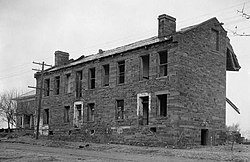Fort Gibson
|
Fort Gibson
|
|

Fort Gibson Barracks Building in 1934
|
|
| Location | Fort Gibson, Oklahoma |
|---|---|
| Coordinates | 35°48′14″N 95°15′26″W / 35.80389°N 95.25722°WCoordinates: 35°48′14″N 95°15′26″W / 35.80389°N 95.25722°W |
| Area | 42 acres (17 ha) |
| Built | 1824 |
| Architect | Matthew Arbuckle |
| NRHP Reference # | 66000631 |
| Significant dates | |
| Added to NRHP | October 15, 1966 |
| Designated NHL | December 19, 1960 |
Fort Gibson is a historic military site located next to the present day city of Fort Gibson, in Muskogee County Oklahoma. It guarded the American frontier in Indian Territory from 1824 until 1888. When constructed, the fort lay farther west than any other military post in the United States; it formed part of the north–south chain of forts intended to maintain peace on the frontier of the American West and to protect the southwestern border of the Louisiana Purchase. The fort succeeded in its peacekeeping mission for more than 50 years, as no massacres or battles occurred there. The fort site is now managed by the Oklahoma Historical Society as the Fort Gibson Historical Site. It is a National Historic Landmark.
Colonel Matthew Arbuckle commanded the 7th Infantry Regiment (United States) from Fort Smith, Arkansas. He moved some of his troops to establish Cantonment Gibson on 21 April 1824 on the Grand River (Oklahoma) just above its confluence with the Arkansas River. This was part of a series of forts which the United States established to protect its western border and the extensive Louisiana Purchase. The US Army named the fort for Colonel (later General) George Gibson, Commissary General of Subsistence. The post surgeon began taking meteorological observations in 1824, and the fort provided the earliest known weather records in Oklahoma. Colonel Arbuckle also established Fort Towson in southern Indian Territory. In the early years, troops constructed a , barracks, other facilities, and roads. They also settled strife between the indigenous Osage Nation, which had been in the area since the seventeenth century, and the earliest bands of western Cherokee settlers.
...
Wikipedia


